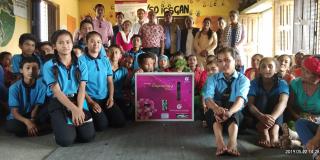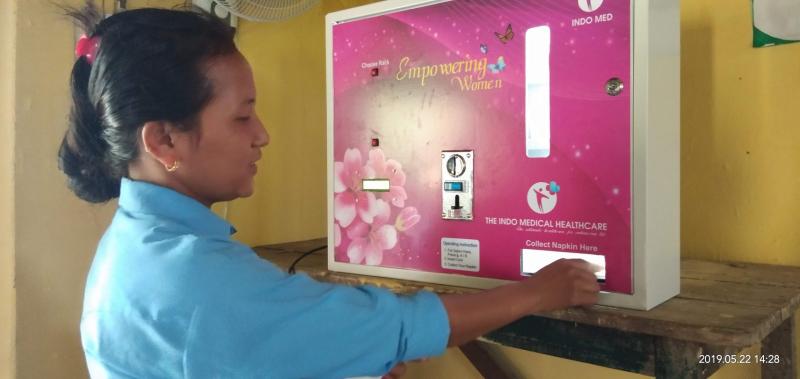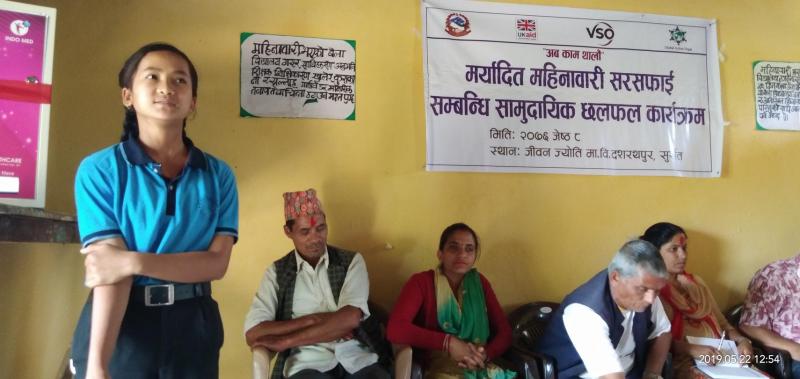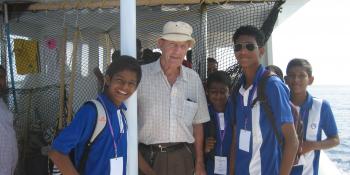
There was a lot of excitement and intrigue as a large cardboard box was hauled out of a jeep and carried up to the school hall. A sizeable crowd of students, parents, teachers, school governors and local politicians had gathered at Jeevan Jyoti School in Surkhet to mark the occasion: The delivery of Surkhet’s first sanitary pad dispensing machine. Supplied by VSO’s ICS (International Citizen Service) working alongside our Sisters for Sisters Education Project this was a gift to a school that had done much to support girls’ education. Emblazoned with the words “Empowering Women” the machine will allow the girls to quickly, affordably and independently get sanitary pads when they need them.

In 2011, 72% of men in Nepal were literate. For women this figure plummeted to 44%, and in Western Nepal menstruation-based discrimination (known as chhaupadi) was a major factor. Traditional beliefs vary considerably depending on region, ethnicity, religion, caste and class. Media has occasional intense focus on the banishment of menstruating women and girls to sheds, but oppression and discrimination of menstruating women can be much more subtle. Under chhaupadi, women and girls are viewed as impure during menstruation. Not everyone is sent away from their home, but they may be confined to one room, excluded from the kitchen, unable to serve themselves food, and even banned from using water taps. Family, teachers and even friends pressure girls to stay away from school during their period. This loss of school time has a major impact on their ability to keep up with their male classmates. VSO’s Sisters for Sisters project, integrated with ICS, has worked hard on Adolescent and Youth Sexual Reproductive Health. Through our network of community, national and international volunteers, we have started discussion on the importance of girls’ education and challenged exclusion.

This event marked more than simply installing a vending machine. It was a school, a community and a municipality publicly declaring their support for girls and pledging to stand up to discrimination. Female students, Karishma and Reshmi, talked movingly about some of the difficulties they still face. Then two boys, Deepak and Krishna gave speeches on the need to support girls at school and at home. Shanti Chhantel, the municipality’s deputy mayor, said she was highly impressed by the initiative VSO had undertaken and she would support further instillations across her municipality’s schools. Our Theatre for a Change drama group gave a moving and challenging interactive theatre performance about some of the hardships Nepali society sometimes inflicts on its young women.
Fourteen years ago Jeevan Jyoti, like many schools in Nepal, was sending girls home for five days every month during their period. The school and the country has come a long way since then. The audience gathered around the machine and were entranced by a demonstration of its use. Reshmi was given the honour of being the first student to use it, and as she held the sanitary pad aloft to the audience her face was filled with pride: girls are finally being told they are wanted, valued and loved each and every day of the month.
Personal reflections
Mina Adhikari, Community Engagement and Leadership Coordinator at Global Action Nepal, VSO’s local implementing partner in Surkhet.
“I grew up in a local, traditional Nepali family, where people believed in the chhaupadi system. When I was a child some of my female relatives used to fill us we fear about menstruation. We didn’t understand what it was, but we knew to fear it. There was no education about menstruation in my school, and I never talked about it with friends or family. I still remember my first period because I was shocked to see blood in my trousers. When i talked to my mom, she pulled me into a dark room and told me that I’d got my period. She said I’d have to hide myself from my father, my brother, and even from the sun. I stayed alone and worried about my friends, school, and everything I was missing. At the same time, I felt ashamed. I worried about how I would face everyone. No one explained to me that it was a natural process and that I should feel proud about the changes. Everyone treated me like a different person: I was teased and taunted, I wasn’t allowed in the kitchen, and my food was separated from the rest of the family’s, to be served on a different plate.”
I was very lucky that I have a supportive father and brother, and it’s because of them that I got the chance to continue my education. When my brother knew about my loneliness and fear, he defied my mother and snuck into my room to keep me company. My father stood up for me too. He convinced my mother and grandmother saying “It happens to every girl. It’s a natural process and as parents we have to understand the situation and support her. She needs emotional support and to eat properly.”
When I heard the boys’ speeches at Jeevan Jyoti School, I remembered my first period and the support from my father and brother. It’s because of them that I am here doing this job. I was so happy to hear the voice and concern of males towards menstruation education. I believe in gender equality. I believe that knowledge and education related to males and females needs to be discussed in same forum because without engaging the support of men and boys, female empowerment is impossible.”
James Russell, VSO International Volunteer Teacher Trainer, Surkhet.
“In the UK we all know about menstruation, but we don’t like to be reminded of it. I grew up seeing sanitary pads absorbing blue antifreeze on TV because people were too queasy to see red. Listening to men, women, boys and girls all talking about periods in Nepal, a county with so much historic menstrual prejudice, was incredible. The day was much more than delivering a vending machine; it was about sending a message to girls. NGO projects like VSO’s Sisters for Sisters and the ICS programme have been spreading the word and lobbying for a long time. Now the government is listening. They have recently promised to provide free sanitary towels in schools across the country. It is telling girls: we want you in school, we won’t discriminate against you, we won’t fill you with shame, and we will support you as you become the future of Nepal.”
Latest posts

Transforming lives through education: Geoffrey’s VSO legacy
With a deep belief in the transformative power of education, Geoffrey from Norfolk, UK, has devoted his life both in the UK and abroad to making education more accessible for all.
